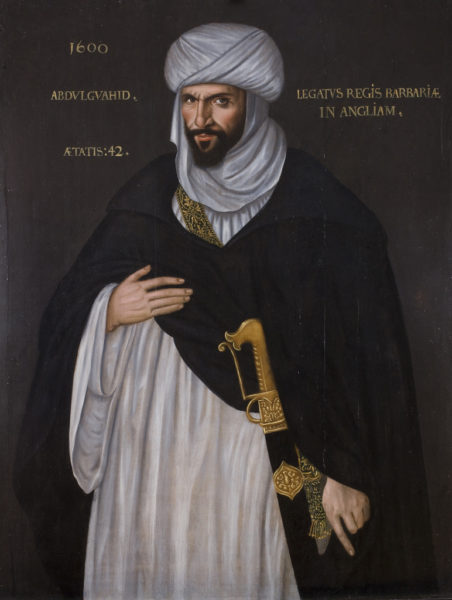The Battle of Ksar El Kebir, also known as Battle of Three Kings (in Arabic: معركة الملوك الثلاث) was fought in northern Morocco, near the town of Ksar-el-Kebir and Larache, on 4 August 1578. The combatants were the army of the deposed Moroccan Sultan Abu Abdallah Mohammed II, with his ally, the King of Portugal Sebastian I, and a large Moroccan army nominally under the new Sultan of Morocco (and uncle of Abu Abdallah Mohammed II) Abd Al-Malik I.
A Plan to Recover the Throne
The Christian king, Sebastian I, had planned a crusade after Abu Abdallah asked him to help recover his throne. Abu Abdallah’s uncle, Abd Al-Malik, had taken it from him with Ottoman support. The defeat of Portugal and attendant death of the childless Sebastian led to the end of the Aviz dynasty, and the integration of the country in the Iberian Union for 60 years under the Philippine Dynasty in a dynastic union with Spain.

Portrait of Abd el-Ouahed ben Messaoud, Moroccan ambassador to England
This portrait commemorates the visit of the King of Fez’s embassy to London in 1600-1. This was the first official painting ever made in England of a Muslim, and it depicts the Moroccan ambassador with a fierce and intimidating look.
Read moreThe Battle
On 4 August, the Portuguese and Moorish allied troops were drawn up in battle array, and Sebastian rode around encouraging the ranks. But the Moroccans advanced on a broad front, planning to encircle his army.
The Sultan had 10,000 cavalry on the wings, and in the center he had placed Moors who had been driven out of Spain and thus bore a special grudge against Christians. Despite his illness, the Sultan left his litter and led his forces on horseback.
The battle started as both sides exchanged several volleys of gunfire from musketry and artillery. A commander named Stukley, leading the Portuguese center, was killed by a cannonball early in the battle. The Moroccan cavalry advanced and began to encircle the Portuguese army. Both armies soon became fully engaged in melee. Eventually the flanks of the Portuguese army gave way to the Moorish cavalry, threatening the center. Seeing the flanks compromised, and having lost its commander early in battle, the Portuguese center lost heart and was overcome.
Defeat of the Portuguese
The battle ended after nearly four hours of heavy fighting. It resulted in the total defeat of the Portuguese and Abu Abdallah’s army with 8,000 dead, including the slaughter of almost the whole of the country’s nobility, and 15,000 taken prisoner; perhaps 100 survivors escaped to the coast. The body of King Sebastian, who led a charge into the midst of the enemy and was then cut off, was never found.
The Sultan Abd Al-Malik also died during the battle, but from natural causes (the effort of riding was too much for him), and the news was concealed from his troops until total victory had been secured. Abu Abdallah attempted to flee but was drowned in the river. For this reason, the battle was known in Morocco as the Battle of the Three Kings.